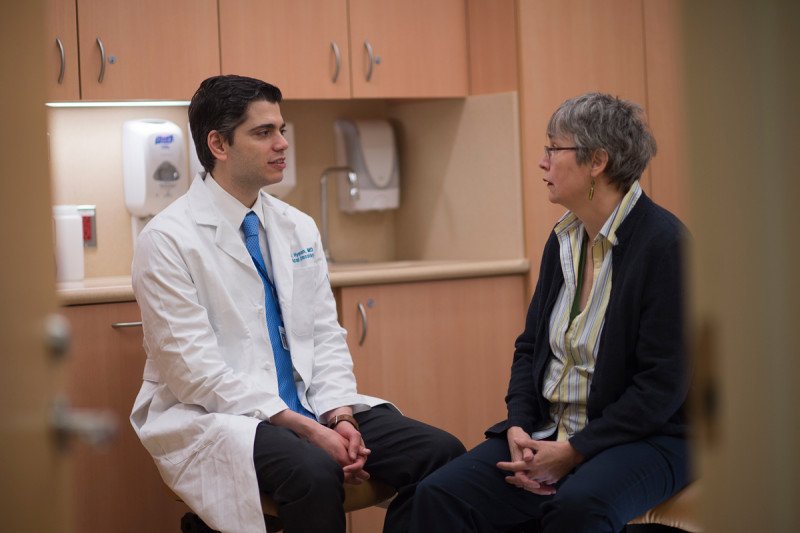
In the growing field of precision oncology, people with cancer increasingly are divided into subgroups and given therapies that target specific mutations found in their tumors. For example, two patients with breast cancer may receive distinct treatments based on the genetics of their individual cancers.
Researchers at Memorial Sloan Kettering have taken this a step further, pioneering the concept of basket trials. Basket trials test therapies on tumors regardless of where they originate in the body, as they may carry the same genetic mutations. Therefore, the same targeted drug may work against many kinds of cancer.
At this year’s meeting of the American Association for Cancer Research (AACR) in Washington, DC, a multicenter international team led by David Hyman, Director of Developmental Therapeutics at MSK, reported findings from a phase II basket trial of an experimental drug called neratinib, which targets a protein called HER2. All patients treated in this study had a mutation in the HER2 gene, although the specific mutation differed from patient to patient. The study was the largest of its kind to evaluate the effectiveness of targeting these HER2 gene mutations.
“We found that in several types of cancer, neratinib showed a potential beneficial effect,” Dr. Hyman says. “The next step is to move it into combinations with other drugs, which we hope will really boost the drug’s efficacy.”
In the trial, called SUMMIT, the drug was more effective in some kinds of cancer than in others. It worked best against breast cancer, cervical cancer, and biliary cancer (a type of liver cancer), shrinking some tumors and preventing others from growing. There also was some benefit in people with non-small cell lung cancer and tumors of the salivary gland. In other cancers, however, fewer positive effects were seen. The researchers aren’t yet sure why these differences occurred, and it’s something they plan to investigate.
Robin’s Story
Robin Gillespie, 57, a scientist with a PhD who works in the field of workplace safety, has been taking neratinib for two years. Dr. Gillespie was diagnosed in 2009 with cervical cancer, and has been coping with metastatic disease since 2011.
After undergoing chemotherapy and radiation, as well as surgery to remove one of her lungs, where the cancer had spread, Dr. Gillespie was told by her doctors that she had exhausted her options for standard treatment. With several small tumors persisting in her remaining lung, an earlier biopsy was tested for mutations that might match her to a clinical trial. Findings from that test brought her to MSK.
Today, her tumors have not disappeared, but they have stopped growing. “Here I am, and I feel pretty well,” she says. The only side effects she has experienced are diarrhea and cracked fingernails, which she says is a great improvement from how she felt during chemotherapy. “The drug comes in tablets, which I can take at home every day,” she says. “Once a month I see one of the doctors at MSK, and I get a CT scan every two months to make sure my tumors are stable. So far they are.”
Dr. Gillespie says she’s aware of the advantages she has in being able to access these kinds of clinical trials as an educated woman living in New York City. She’s now actively working to help recruit more women with cervical cancer to the trial. “I want women to know that they have other treatment options, and this study could be one of them,” she says. “I’m reaching out to people through various support groups because I feel strongly that people should know about this trial.”
Targeting a Shared Mutation
What Dr. Gillespie and the other patients in the SUMMIT trial have in common is that their tumors have mutations in the gene HER2 that lead to a defective protein. Neratinib targets these defects, which researchers believe are driving the cancer. (This mutation is different from the HER2 variation commonly seen in breast and stomach cancers.)
Dr. Hyman refers to the trial as a second-generation basket study. An earlier basket study from MSK, published in the New England Journal of Medicine in 2015, evaluated a drug that had been developed and FDA approved to treat melanomas with a mutation in a gene called BRAF to see if it would also be effective against other types of cancers with BRAF mutations.
Neratinib, on the other hand, is an experimental drug that is being investigated exclusively in clinical trials. Also, unlike the prior basket study that looked at only one mutation in BRAF, the SUMMIT study is looking at more than 20 unique mutations in HER2. “This adds another level of complexity, but also opportunity,” Dr. Hyman says.
“The particular mutations we are targeting with these new basket studies are rare, yet they appear across many different diseases. There are not enough patients with any one type of disease to evaluate this drug,” he adds.
Dr. Hyman notes that because of the nature of basket studies, multicenter international collaborations are extremely important. “It’s hard to get enough patients in one place to be able to evaluate these kinds of drugs,” he says. So far, the trial has included 141 patients from about a dozen hospitals in the United States, Spain, and Australia.
“MSK contributed the largest number of patients to this study,” Dr. Hyman adds, “but we wouldn’t have been able to carry it out without the involvement of all these other institutions. Robin’s story illustrates how important it is that patients with rare diseases, like cervical and biliary cancers, be offered testing to look for these type of mutations.”
“It’s not a miracle treatment,” Dr. Gillespie says. “We don’t know how long it might work. But so far, it keeps me alive, and productive, and pretty strong. These are all good things!”







